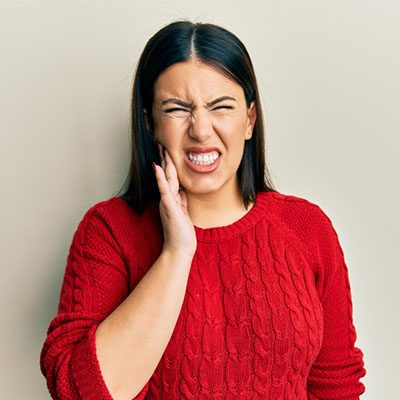Emergency Dentistry

Emergency Dentistry Thornton
If you are in extreme pain or experience a sudden change in your mouth or jaw, it constitutes a dental emergency. If you have a dental emergency, you must remain calm and contact our team immediately.
If you have a dental concern but are unsure whether it is an emergency, we recommend calling Thornton, Maitland NSW dentist to inquire about your situation.
Our team of highly qualified administrative staff can assess your dental distress and determine the urgency of treatment.
You can save your teeth and dental health by taking quick action when mishaps occur! If you need an emergency dentist, contact us immediately; we will have one waiting.
What Constitutes A Dental Emergency?
- Severe toothache
- A broken or cracked tooth
- Severe pain in your gums/jaw
- A tooth being knocked out
- Denture repairs
- Sports injuries
Things to do if a tooth is knocked out:
- For a clean tooth, place the tooth straight back into the socket. The tooth should be held by its upper part (crown part), not the root.
- For a dirty tooth, wash it in milk or saliva by gently placing it in the mouth and back into the socket.
- If you can’t place the tooth back into the socket, place it in milk or gently wrap it in plastic.
Same Day Dental Emergency Service in Thornton
We understand that patients genuinely in a dental emergency need priority attention. That’s why we try to keep some daily space in our appointment books for patients who require an emergency dentist.
If you are in pain, visit us as soon as possible. We provide same-day appointments for dental emergency cases and comprehensive care for almost any dental emergency. Our experienced and responsive dental team provides treatment in a caring and compassionate manner. Call us on (02) 4966 2996 right away.
Risks arise from every invasive or surgical operation. Before proceeding, you are advised to get a second opinion from a duly licensed medical practitioner.
Visit us at Thornton Shopping Centre, Shop 30/1 Taylor Ave in Thornton.
What is emergency dentistry?
Emergency dentistry addresses urgent dental issues such as severe pain, broken teeth, or infections that require immediate attention.
When should I seek emergency dental care?
Seek emergency care for severe tooth pain, knocked-out or broken teeth, bleeding that won’t stop, or signs of infection like swelling or fever.
What should I do if I knock out a tooth?
Keep the tooth moist, ideally in milk, and seek immediate dental care. If possible, try to place the tooth back in the socket.
I have a dental emergency; can I go to the ER?
Yes, but it’s preferable to visit a dentist. ERs can manage pain and infections but are not equipped for dental procedures.
How can I manage severe tooth pain until I see a dentist?
Use over-the-counter pain medicines, apply a cold compress to minimise swelling, and rinse with warm salt water.
What if I break a tooth?
Rinse your mouth with warm water, save broken pieces, and seek immediate dental care. Use a cold compress on the affected area to lessen swelling.
What should I do if I have a severe toothache?
Take a pain reliever that can be used, and rinse with warm salt water after flossing to remove debris. Seek Thornton dentist as soon as you can.
How do I handle a dental abscess?
To prevent the infection from worsening, take over-the-counter painkillers, gargle your mouth with brine water, and get dental care immediately.
What are the common causes of dental emergencies?
Common causes include trauma from accidents, sports injuries, untreated cavities, gum disease, and biting hard foods.
Does insurance cover emergency dental services?
Coverage varies by insurance plan. Check with your provider to understand what emergency services are covered.
What should I do if my child has a dental emergency?
Keep calm, rinse their mouth with water, and apply a cold compress if there is swelling. Seek immediate dental care.
Can I prevent dental emergencies?
Regular dental check-ups, good oral hygiene, wearing mouthguards during sports, and avoiding hard foods can help prevent emergencies.
